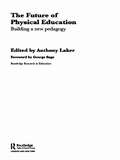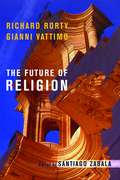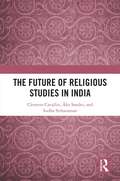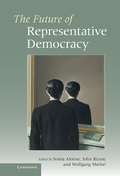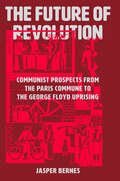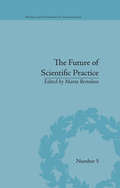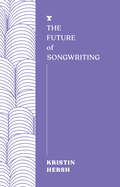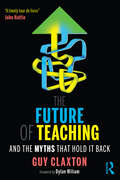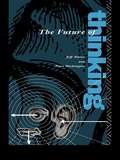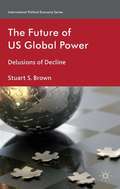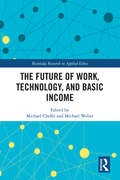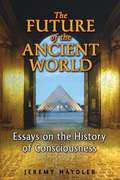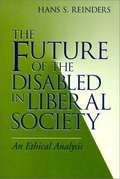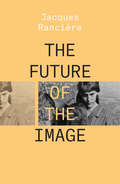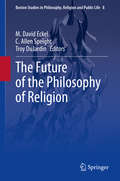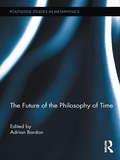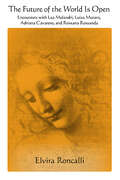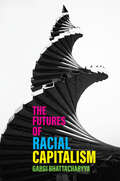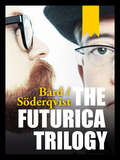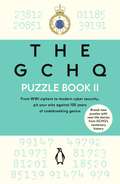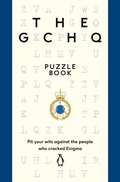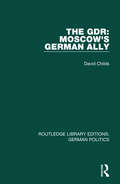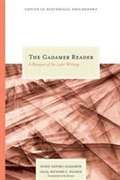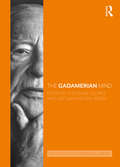- Table View
- List View
The Future of Physical Education: Building a New Pedagogy (Routledge Research in Education #Vol. 6)
by Anthony LakerAnthony Laker leads an outstanding international team of educational theorists in critically examining the theoretical underpinnings of physical education, and in challenging the rhetoric, the practices and the pedagogies that prevail in our schools. There has been a great deal of discussion surrounding the value of this subject in schools, particularly around the form that physical education should take. The domination of physical education teaching by the scientific / technical discourses is problemized and it is suggested that this domination limits the potential of the subject to be culturally and contextually relevant to students in schools. This edited collection aims to extend the worldwide academic debate of the future of physical education in schools by challenging the prevailing 'authorised curricula'.Each contributor address a key contemporary issue in physical education bringing different perspectives as they relate to the evolving issues of the subject. They ask important questions about where we intend to take the knowledge we have gained from a legacy of positive research. These chapters tackle critical issues in modernist physical education and suggest how a re-evaluation could contribute to the continuing advancement of the subject for more diverse educational benefits. Laker draws this body of work together in a conclusion that describes a theoretically and pedagogically innovative physical education curriculum for the 21st century.This book is a summary of the current state of research in physical education. It invites debate and discussions in the field and re-conceptualises physical education theory into inclusive practices located in the postmodern school world.
The Future of Religion
by Gianni Vattimo Santiago Zabala Richard RortyThough coming from distinct intellectual traditions, Richard Rorty and Gianni Vattimo are united in their criticism of the metaphysical tradition. The challenges they put forward extend beyond philosophy and entail a reconsideration of the foundations of belief in God and the religious life. They urge that the rejection of metaphysical truth does not necessitate the death of religion. Instead it opens new ways of imagining what it is to be religious. This unique collaboration fuses pragmatism (Rorty) and hermeneutics (Vattimo) and recognizes the limits of both traditional religious belief and modern secularism. Rorty discusses Vattimo's work Belief and argues that the end of metaphysics paves the way for an anti-essentialist religion. Vattimo explores the surprising congruence between Christianity and hermeneutics in light of the dissolution of metaphysical truth. In a concluding dialogue, both philosophers analyze the future of religion together with the political, social, and historical aspects that characterize our contemporary postmodern, postmetaphysical, and post-Christian world.
The Future of Religion: World Religions And The Future
by Gianni Vattimo Richard RortyThough coming from different and distinct intellectual traditions, Richard Rorty and Gianni Vattimo are united in their criticism of the metaphysical tradition. The challenges they put forward extend beyond philosophy and entail a reconsideration of the foundations of belief in God and the religious life. They urge that the rejection of metaphysical truth does not necessitate the death of religion; instead it opens new ways of imagining what it is to be religious—ways that emphasize charity, solidarity, and irony. This unique collaboration, which includes a dialogue between the two philosophers, is notable not only for its fusion of pragmatism (Rorty) and hermeneutics (Vattimo) but also for its recognition of the limits of both traditional religious belief and modern secularism.In "Anticlericalism and Atheism" Rorty discusses Vattimo's work Belief and argues that the end of metaphysics paves the way for an anti-essentialist religion. Rorty's conception of religion, determined by private motives, is designed to produce the gospel's promise that henceforth God will not consider humanity as a servant but as a friend. In "The Age of Interpretation," Vattimo, who is both a devout Catholic and a frequent critic of the church, explores the surprising congruence between Christianity and hermeneutics in light of the dissolution of metaphysical truth. As in hermeneutics, interpretation is central to Christianity, which introduced the world to the principle of interiority, dissolving the experience of objective reality into "listening to and interpreting messages." The lively dialogue that concludes this volume, moderated and edited by Santiago Zabala, analyzes the future of religion together with the political, social, and historical aspects that characterize our contemporary postmodern, postmetaphysical, and post-Christian world.
The Future of Religious Studies in India
by Clemens Cavallin Åke Sander Sudha SitharamanThis book looks at how religious studies is framed and taught in India. It addresses the contradiction between the country’s vibrant religious life and the dearth of comparative and social scientific religious studies programs across Indian universities. The volume: • Studies the efforts by Rabindranath Tagore in Santiniketan and Mohan Malaviya in Varanasi, to introduce and institutionalize religious studies in India; • Discusses the notions of religion and spirituality and situates the failure of the ‘secularization thesis’ in the context of modern India; • Provides concrete suggestions on how to develop religious studies in relation to global citizenship and Indian cultural heritage with the hope of initiating a larger discussion. A unique contribution to the study of religion in society and education, the book will be indispensable to students and researchers of theology, history, philosophy, sociology, secularization, globalization, religious studies, education studies, and South Asian studies.
The Future of Representative Democracy
by John Keane Sonia Alonso Wolfgang MerkelThe Future of Representative Democracy poses important questions about representation, representative democracy and their future. Inspired by the last major investigation of the subject by Hanna Pitkin over four decades ago, this ambitious volume fills a major gap in the literature by examining the future of representative forms of democracy in terms of present-day trends and past theories of representative democracy. Aware of the pressing need for clarifying key concepts and institutional trends, the volume aims to break down barriers among disciplines and to establish an interdisciplinary dialogue among scholars. The contributors emphasise that representative democracy and its future is a subject of pressing scholarly concern and public importance. Paying close attention to the unfinished, two-centuries-old relationship between democracy and representation, this book offers a fresh perspective on current problems and dilemmas of representative democracy and the possible future development of new forms of democratic representation.
The Future of Revolution: Communist Prospects from the Paris Commune to the George Floyd Uprising
by Jasper BernesHow might a twenty-first-century revolution against class society succeed?Communism comes from the future, but its hopes haunt our past. Reading revolutionary history from the Paris Commune to the George Floyd Uprising by the light of communist theory, from Marx to C. L. R. James, The Future of Revolution illuminates the possibilities for overcoming class society in the twenty-first century.When Marx wrote that the Paris Commune of 1871 showed that &“the working class cannot simply lay hold of the ready-made state machinery, and wield it for its own purposes,&” he identified a principle that will remain true as long as capitalism and its class antagonism persist. Historical revolutions reveal essential features of our communist horizon, which would-be revolutionaries, then as now, must negotiate one way or another. In chapters that move from a critical history of the workers&’ council to a reading of Marx&’s theory of value as an inverted description of communism, Jasper Bernes synthesizes from a history of failure the key criteria for success. He defines for our present moment the urgent mission of the world proletariat.
The Future of Scientific Practice: 'Bio-Techno-Logos' (History and Philosophy of Technoscience #5)
by Marta BertolasoFocusing on cell dynamics, molecular medicine and robotics, contributors explore the interplay between biological, technological and theoretical ways of thinking. The collection makes a strong contribution to current debates in the philosophy of science and the changing role of scientific practice.
The Future of Songwriting
by Kristin HershThrowing Muses frontwoman and critically acclaimed solo artist Kristin Hersh meditates on the future of her craft in this wry, existential and passionate addition to Melville House&’s new series, FUTURES.Over a long, hot Christmas in Australia, Throwing Muses frontwoman and critically acclaimed solo artist Kristin Hersh considers her future as a songwriter.Is it possible to create music and not show off about it? How can artists establish and refine a following without becoming part of the commercial problem? And just how many times is it healthy to watch It's A Wonderful Life in 3 weeks?In The Future of Songwriting, Hersh chooses to interrogate these questions through philosophical dialogue. From in-depth conversations with a comedian friend about the similarities between songs and jokes, via a fruitful visit to Sydney's 'bone museums', to a revelation from an acupuncturist in New Orleans, she delivers a fierce, funny and existential meditation on the art of the song – and its future.
The Future of Teaching: And the Myths That Hold It Back
by Guy ClaxtonIt’s time for the educational slugfest to stop. ‘Traditional’ and ‘progressive’ education are both caricatures, and bashing cartoon images of each other is unprofitable and unedifying. The search for a new model of education – one that is genuinely empowering for all young people – is serious and necessary. Some good progress has already been made, but teachers and school leaders are being held back by specious beliefs, false oppositions and the limited thinking of orthodoxy. Drawing on recent experience in England, North America and Australasia, but applicable round the world, The Future of Teaching clears away this logjam of bad science and slack thinking and frees up the stream of much-needed innovation. This timely book aims to banish arguments based on false claims about the brain and poor understanding of cognitive science, reclaim the nuanced middle ground of teaching that develops both rigorous knowledge and ‘character’, and lay the foundations for a 21st-century education worthy of the name.
The Future of Thinking: Rhetoric and Liberal Arts Teaching
by Peter Washington Ga* Jeff MasonLearning to think is a complex process made up of reading, writing listening, speaking and remembering textual materials. The aim of this topical book is to encourage practical educational reform in the Humanities by taking the emphasis away from the reception of texts to their production. Adapting rhetorical teaching methods, the authors encourage students to participate in the activities of thinking giving them short written and verbal exercises to develop conceptual competences and linguistics skills. It is argued that these methods can be implemented successfully across a wide number of humanities subjects and that they encourage the development of practical transferable skills, both cognitive and linguistic.The authors have used these methods successfully in class, and the book includes sample exercises, the initial results, and feedback from their students.
The Future of US Global Power
by Stuart S. BrownDispelling the myth of decline, Stuart Brown argues that the US continues to enjoy the economic, political, cultural and military underpinnings befitting a pre-eminent global power. He provides an analytical tour through the major domestic and foreign policy issues that will impact the United States' future position and role in the global system.
The Future of Work, Technology, and Basic Income (Routledge Research in Applied Ethics)
by Michael Weber Michael CholbiTechnological advances in computerization and robotics threaten to eliminate countless jobs from the labor market in the near future. These advances have reignited the debate about universal basic income. The essays in this collection offer unique and compelling perspectives on the ever-changing nature of work and the plausibility of a universal basic income to address the elimination of jobs from the workforce. The essays address a number of topics related to these issues, including the prospects of libertarian and anarchist justifications for a universal basic income, the positive impact of a basic income on intimate laborers such as sex workers and surrogates, the nature of "bad work" and who will do it if everyone receives a basic income, whether a universal basic income is objectionably paternalistic, and viable alternatives to a universal basic income. This book raises complex questions and avenues for future research about universal basic income and the future of work in our increasingly technological society. It will be of keen interest to graduate students and scholars in political philosophy, economics, political science, and public policy who are interested in these debates.
The Future of the Ancient World: Essays on the History of Consciousness
by Jeremy NaydlerThe sacred consciousness that prevailed in antiquity is the key to unlocking our future • Shows how scientific consciousness, which gives primacy to the sense of sight, estranged us from the participatory spiritual consciousness of antiquity • Explores the vital importance of the imagination in reconnecting us to the spirit world The Future of the Ancient World sheds new light on the evolution of consciousness from antiquity to modern times. The twelve essays in this book examine developments in human consciousness over the past five thousand years that most history books do not touch. In ancient times, human beings were finely attuned to the invisible world of the gods, spirits, and ancestors. Today, by contrast, our modern scientific consciousness regards what is physically imperceptible as unreal. Our experience of the natural world has shifted from an awareness of the divine presence animating all things to the mere scientific analyses of physical attributes, a deadened mode of awareness that relies on our ability to believe only in what we can see. In these richly illustrated and wide-ranging essays that span the cultures of ancient Egypt, Mesopotamia, Greece, Rome, and the early Christian period, Jeremy Naydler shows how the consciousness that prevailed in ancient times may inspire us toward a future in which we once again reconnect with invisible realms. If the history of consciousness bears witness to the loss of visionary and participatory awareness, it also shows a new possibility--the possibility of developing a free and objective relationship to the spirit world. Naydler urges us not only to draw inspiration from the wisdom of the ancients but to carry this wisdom forward into the future in a renewed relationship to the spiritual that is based on human freedom and responsibility.
The Future of the Disabled in Liberal Society: An Ethical Analysis
by Hans S. ReindersIn this book, Reinders points out that the possibility of preventing disabled lives is at odds with our commitment to the full inclusion of disabled citizens in society. This powerful critique of contemporary bioethics is sure to become required reading for those interested in human development, special education, ethics, philosophy, and theology.
The Future of the Image
by Jacques RanciereLauded by major contemporary artists and philosophers, Jacques Rancière’s work returns politics to its central place in understanding art. In The Future of the Image,Jacques Rancière develops a fascinating new concept of the image incontemporary art, showing how art and politics have always beenintrinsically intertwined. Covering a range of art movements, filmmakers such as Godard and Bresson, andthinkers such as Foucault, Deleuze, Adorno, Barthes, Lyotard andGreenberg, Rancière shows that contemporary theorists of the image aresuffering from religious tendencies.He argues that there is a starkpolitical choice in art: it can either reinforce a radical democracy,or create a new reactionary mysticism. For Rancière there is never apure art: the aesthetic revolution must always embrace egalitarianideals.
The Future of the Philosophy of Religion (Boston Studies in Philosophy, Religion and Public Life #8)
by C. Allen Speight M. David Eckel Troy DuJardinThis collection of essays on the philosophy of religion and its future brings together accomplished thinkers across several related fields, from comparative philosophy to analytic and continental philosophy of religion and beyond. Contributing authors address pressing questions including: Where does philosophy stand in relation to religion and the study of religion in the 21st century? How ought the philosophy of religion to interact with religious studies and theology to make for fruitful interdisciplinary engagement? And what does philosophy uniquely have to offer to the broad discourse on religion in the modern world? Through exploring these questions and more, the authors’ goal is not that of meeting the philosophical future, but of forging it. Readers will enter a vivid conversation through engaging essays which demonstrate the importance of disciplinary openness and show that we do not need to sacrifice depth in order to achieve breadth. Modernity and postmodernity come together in a constantly evolving discussion that moves the philosophy of religion forward, while keeping an eye toward the experience accumulated in past centuries. This book will interest students of philosophy, theology, religious studies, and other fields that wonder about the place of philosophy and religion in today’s world. It also has much to offer advanced scholars in these fields, through its breadth and forward thinking.
The Future of the Philosophy of Time (Routledge Studies in Metaphysics)
by Adrian BardonThe last century has seen enormous progress in our understanding of time. This volume features original essays by the foremost philosophers of time discussing the goals and methodology of the philosophy of time, and examining the best way to move forward with regard to the field's core issues. The collection is unique in combining cutting edge work on time with a focus on the big picture of time studies as a discipline. The major questions asked include: What are the implications of relativity and quantum physics on our understanding of time? Is the passage of time real, or just a subjective phenomenon? Are the past and future real, or is the present all that exists? If the future is real and unchanging (as contemporary physics seems to suggest), how is free will possible? Since only the present moment is perceived, how does the experience as we know it come about? How does experience take on its character of a continuous flow of moments or events? What explains the apparent one-way direction of time? Is time travel a logical/metaphysical possibility?
The Future of the World Is Open: Encounters with Lea Melandri, Luisa Muraro, Adriana Cavarero, and Rossana Rossanda (SUNY series in Contemporary Italian Philosophy)
by Elvira RoncalliThe Future of the World Is Open examines the work and thought of three prominent Italian feminist philosophers, Lea Melandri, Luisa Muraro, and Adriana Cavarero, as it delves into the significant experiences that shaped them, highlighting their converging and diverging positions. Also appearing here for the first time in English translation are three essays by renowned author, journalist, and political figure Rossana Rossanda. Rossanda's essays offer a critical perspective on some of the contentious theoretical nodes with which Italian feminist thought has wrestled. Written in terse and engaging language, this book explores challenging philosophical and political questions, with themes including masculine domination; the body as the site of sedimented lived experience; sexual difference; the symbolic; the imaginary; feminine political authority; feminine subjectivity; and material humanism. A vivid picture of the socio-political context of Italian feminism emerges—illuminating its strong commitment to practice—and informing and enriching contemporary discussions at the intersection of different disciplinary perspectives.
The Futures of Racial Capitalism
by Gargi BhattacharyyaCapitalism appears to be endlessly in crisis but without ever loosening its hold on our lives. New modes of racism and exclusion emerge, but the old ones never go away. We continue to struggle to live and survive in its wake but are unable, still now, to build commonality with each other. In this incisive book, Gargi Bhattacharyya revisits debates about racial capitalism and its violence through differentiation. Taking the four lenses of prisons, borders, debt and platforms, Bhattacharyya reveals how this moment of capitalist crisis positions humans as expendable, but differentially so, in a process that remakes longstanding racialized hierarchies. Uncovering practices and techniques embedded in the shifting processes of accumulation and state power, the chapters illuminate how value is extracted from populations through non-wage routes and indebtedness. This engaging introduction to racial capitalism offers an interlocking and insightful analysis of capitalist renewal, essential for students and scholars interested in issues of race, racism and inequality.
The Futurica Trilogy
by Alexander Bard Jan SöderqvistIn the late 1990's, Swedish social theorists Alexander Bard and Jan Söderqvist started working on a radical new theory, since referred to as The Netocracy Hypothesis. At this early stage Bard & Söderqvist foresaw that the control of the internet would be the subject of the main power struggle for the next century.
The GCHQ Puzzle Book II
by GCHQTrain your brain with these fiendishly difficult puzzles, the perfect companion for anyone wanting to keep their mind busy'Fiendishly tricky' Daily MailWith their first bestselling book, The GCHQ Puzzle Book, the UK's intelligence and security experts tested us with puzzles, codes and real-life entrance tests from their archives.Now, they are back with a NEW collection of head-scratching, mind-boggling and brain-bending puzzles that will leave you pondering for hours.For those who often found themselves stumped with the first book, The GCHQ Puzzle Book 2 offers even more starter puzzles to get those brains warmed up. Puzzle aficionados needn't worry though, as there is also an 'Even Harder' section to test everyone to their limits . . .Not only that, but in celebration of GCHQ's centenary, the puzzles in this new book sit alongside stories, facts and photos from the organisation's first 100 years at the heart of the nation's security. From the Government Code & Cipher School, to Bletchley Park, through to protecting against cyberattacks, the security of our country is in the hands of GCHQ. With this book, you get exclusive snapshots into the organisation that keeps us all safe.Train your brain to compete with the smartest in the country with this stimulating book of puzzles. If you haven't yet tested yourself with the first instalment of The GCHQ Puzzle Book, check it out now!'This is the perfect gift to fuel his ludicrous presumption that he could have definitely been a spy - even better if he's already dog-eared the first version' Huffington Post
The GCHQ Puzzle Book: Perfect for anyone who likes a good headscratcher
by GCHQSharpen your mind to beat the smartest brains in Britain with the original official GCHQ puzzle bookWould GCHQ recruit you? Pit your wits against the people who cracked Enigma in the official puzzle book from Britain's top secret intelligence and security organisationOver the years, their codebreakers have helped keep our country safe, from the Bletchley Park breakthroughs of WWII to the modern-day threat of cyber attack. So it comes as no surprise that, even in their time off, the staff at GCHQ love a good puzzle.Whether they're recruiting new staff or challenging each other to the toughest Christmas quizzes and treasure hunts imaginable, puzzles are at the heart of what GCHQ does. Now they're opening up their archives of decades' worth of codes, puzzles and challenges for everyone to try.In this book you will find:- Tips on how to get into the mindset of a codebreaker- Puzzles ranging in difficulty from easy to brain-bending- A competition section where we search for Britain's smartest puzzlerWith hundreds of stimulating puzzles, The GCHQ Puzzle Book is the perfect companion and will keep you occupied as you attempt to beat the smartest brains in Britain.GOOD LUCK!'Fiendish . . . as frustrating, divisive and annoying as it is deeply fulfilling' Guardian'Ideal for the crossword enthusiast' Daily TelegraphLooking for more ways to test yourself? The GCHQ Puzzle Book 2, a new collection of head-scratching, mind-boggling and brain-bending puzzles is out now!
The GDR: Moscow's German Ally (Routledge Library Editions: German Politics)
by David ChildsWidely praised in its first edition, the second edition of The GDR was updated to cover events through the spring of 1988, examining in particular the impact of new leadership in both Bonn and Moscow and of the changing world economy on the prospects of the GDR.
The Gadamer Reader: A Bouquet Of The Later Writings
by Hans-Georg Gadamer Richard E. PalmerThe German volume Gadamer Lesebuch [A Gadamer Reader] (1997), selected and edited by Jean Grondin in consultation with Hans-Georg Gadamer himself, contains a set of essays that present a cross section of writings by one of the twentieth century's greatest philosophers. The volume begins with an autobiographical sketch and culminates in a conversation with Jean Grondin that looks back over a lifetime of productive philosophical work. The essays not already available in English have here been translated by Richard E. Palmer, a respected translator of Gadamer's writings. The sixteen essays contained in the Lesebuch are augmented here by three other essays: Gadamer's last essay on Derrida, "Hermeneutics Tracking the Trace" (1994) and two essays on practical philosophy. The Gadamer Reader: A Bouquet of the Later Writings richly conveys the scope and depth of Gadamer's thought, covering the range of his work in hermeneutics, aesthetics, practical philosophy, and essays on Plato, Hegel, and Heidegger. In addition, Palmer offers introductory remarks before each essay that explain its importance in the context of Gadamer's writings and define its key terms. Throughout, in both his translation and commentary, his aim is to make this critically important philosopher as clear and accessible as possible to an English-speaking audience.
The Gadamerian Mind (Routledge Philosophical Minds)
by Theodore GeorgeHans-Georg Gadamer (1900–2002) is one of the most important philosophers of the post-1945 era. His name has become all but synonymous with the philosophical study of hermeneutics, the field concerned with theories of understanding and interpretation and laid out in his landmark book Truth and Method. Influential not only within continental philosophy, Gadamer’s thought has also made significant contributions to related fields such as religion, literary theory, and education. The Gadamerian Mind is a major survey of the fundamental aspects of Gadamer’s thought, with contributions from leading scholars of Gadamer and hermeneutics from around the world. 38 chapters are divided into six clear parts: Overviews Key concepts Historical influences Contemporary encounters Beyond philosophy Legacies and questions. Although Gadamer’s work addresses a remarkable range of topics, careful consideration is given throughout the volume to consistent concerns that orient his thought. Important in this respect is his relation to philosophers in the Western tradition, from Plato to Heidegger. An indispensable resource for anyone studying and researching Gadamer, hermeneutics, and the history of twentieth-century philosophy, The Gadamerian Mind will also be of interest to those in related disciplines such as religion, literature, political theory, and education.
